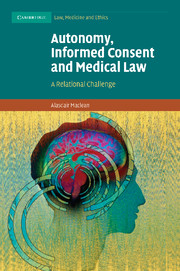Book contents
- Frontmatter
- Contents
- Table of cases
- List of figures
- Acknowledgements
- Introduction
- Part I An ethical model
- Part II Consent and the law
- 5 The legal regulation of consent
- 6 Rationalising the law and ethics of consent
- 7 Constructing consent: Future regulation and the practice of healthcare
- Summary and conclusion
- Bibliography
- Index
5 - The legal regulation of consent
Published online by Cambridge University Press: 02 July 2009
- Frontmatter
- Contents
- Table of cases
- List of figures
- Acknowledgements
- Introduction
- Part I An ethical model
- Part II Consent and the law
- 5 The legal regulation of consent
- 6 Rationalising the law and ethics of consent
- 7 Constructing consent: Future regulation and the practice of healthcare
- Summary and conclusion
- Bibliography
- Index
Summary
The courts repeatedly proclaim the value that the law gives to the individual's right to self-determination. For example, in S v. McC; W v. W, Lord Reid stated:
There is no doubt that a person of full age and capacity cannot be ordered to undergo a blood test against his will … The real reason is that English law goes to great lengths to protect a person of full age and capacity from interference with his personal liberty.
Similarly, in Nancy B v. Hotel-Dieu de Quebec, Dufour J quoted with approval the words of Professor Beaudoin (a justice of the Quebec Court of Appeal) who stated:
For a competent person of the age of majority, the making of his own decisions with respect to his own body is the legal expression of the principle of personal autonomy and of the right to self-determination.
This right exists regardless of the consequences for the individual. In principle the law protects the individual's right to self-determination even when the likely consequence is the person's death. In Re T, Lord Donaldson even went so far as to claim that, at least for competent adults, making decisions about their medical treatment the right is absolute.
For the law to protect personal autonomy, it must prohibit an invasion of that right and provide for sanctions when a breach does occur. This protection is achieved by allowing individuals a personal sphere of control mediated by consent.
- Type
- Chapter
- Information
- Autonomy, Informed Consent and Medical LawA Relational Challenge, pp. 149 - 190Publisher: Cambridge University PressPrint publication year: 2009

